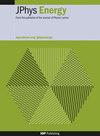用于储热和热管理的高焓有机相变材料的研究
IF 6.3
3区 材料科学
Q1 ENERGY & FUELS
引用次数: 1
摘要
相变材料(PCM)在热能储存和热管理方面的潜在作用引起了人们对其日益增长的兴趣。材料的选择很大程度上取决于所需的温度范围,而固液相变的潜热必须尽可能高。在其他有机PCM中,糖醇由于其可获得性和某些有利的性质而引起了人们的关注。然而,这些材料的热过程仍然需要研究。在本工作中,我们重点研究了在80°C - 100°C范围内发生固液相变的材料。进行了全面的文献调查,以阐明与此范围相关的可用糖醇。人们发现,使用这种类型的纯材料不是很实用,因为它们在所需范围内的稀缺性以及它们的特定特性,如难以结晶和凝固。另一方面,在文献的基础上,我们发现了赤藓糖醇与其他有机物质的共晶混合物,即赤藓糖醇-木糖醇、赤藓糖醇-尿素和赤藓糖醇-三甲基乙烷(TME)。在所有这些情况下,值得注意的是,虽然组分通常具有相当高的熔融温度,但共晶混合物的相变在要求的范围内。然而,每种混合物都有其独特的特点,尤其是在冷却和凝固方面。进行了广泛的实验研究,以提供这些主要过程的详细可视化。结果表明,赤藓糖醇-木糖醇的熔融温度和潜热分别为84℃和190 J g−1,赤藓糖醇-尿素的熔融温度和潜热分别为82℃和227 J g−1。赤藓糖醇- tme在82℃和97℃时发生两个相变,总潜热为198 J g−1。基于目前的研究结果,赤四醇-尿素混合物在80°C - 100°C的熔融范围内是最佳的PCM候选者。本文章由计算机程序翻译,如有差异,请以英文原文为准。
Investigation of high-enthalpy organic phase-change materials for heat storage and thermal management
The growing interest in phase-change materials (PCM) is related to their possible role in thermal energy storage and thermal management. The choice of materials depends strongly on the required temperature range, whereas the latent heat of solid–liquid phase transition has to be as high as possible. Among other organic PCM, sugar alcohols have gained some attention due to their availability and certain advantageous properties. However, the thermal processes in these materials still require investigation. In the present work, we focused on the materials with solid–liquid phase change within 80 °C–100 °C. A comprehensive literature survey was conducted to elucidate the available sugar alcohols relevant to this range. It was found that the use of pure materials of this type is not very practical, because of their scarcity in the required range and their specific features, like difficulties with crystallization and solidification. On the other hand, based on the literature, we have discerned three eutectic mixtures of erythritol with other organic materials, namely, erythritol–xylitol, erythritol–urea and erythritol– trimethylolethane (TME). In all those cases, it is remarkable that while the components commonly have rather high melting temperatures, the eutectic mixtures had the phase transitions in the required range. Still, each of these mixtures has its own peculiar features, especially at cooling and solidification. An extensive experimental study was performed to provide detailed visualization of these major processes. The results revealed the melting temperature and latent heat of the mixtures to be: 84 °C and 190 J g−1 for erythritol–xylitol, 82 °C and 227 J g−1 for erythritol–urea. Erythritol–TME has two phase transitions at 82 °C and 97 °C, with total latent heat of 198 J g−1. Based on the present findings, the erythritol–urea mixture is the best PCM candidate for the melting range within 80 °C–100 °C.
求助全文
通过发布文献求助,成功后即可免费获取论文全文。
去求助
来源期刊

Journal of Physics-Energy
Multiple-
CiteScore
10.90
自引率
1.40%
发文量
58
期刊介绍:
The Journal of Physics-Energy is an interdisciplinary and fully open-access publication dedicated to setting the agenda for the identification and dissemination of the most exciting and significant advancements in all realms of energy-related research. Committed to the principles of open science, JPhys Energy is designed to maximize the exchange of knowledge between both established and emerging communities, thereby fostering a collaborative and inclusive environment for the advancement of energy research.
 求助内容:
求助内容: 应助结果提醒方式:
应助结果提醒方式:


